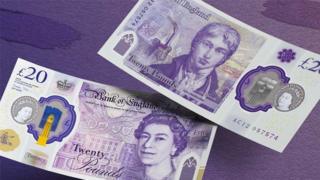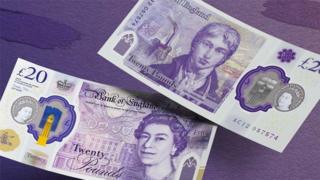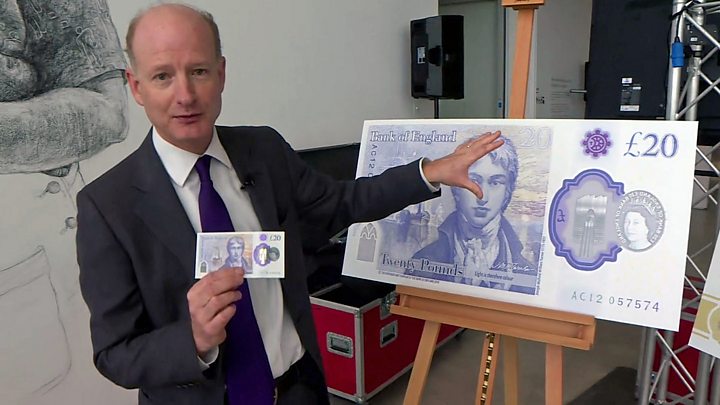New polymer £20 featuring painter Turner enters circulation
A new polymer £20 banknote featuring artist JMW Turner starts to appear in ATMs on Thursday. …

 Image copyright Bank of England
Image copyright Bank of England You’ll soon no longer find Adam Smith in your wallet or purse. The economist has been replaced as the face of the £20 note by artist JMW Turner.
The Bank of England said the new polymer £20 – which enters circulation on Thursday – is its most secure ever banknote.
It includes two see-through windows and a two colour foil to help beat forgers.
The Bank reckons half of all ATMs across the UK to be dispensing the new notes in just two weeks’ time.
The new £20 is the third plastic banknote to be issued by the Bank of England after the fiver featuring Winston Churchill – launched in 2016 – and the tenner featuring Jane Austen, which was first issued in 2017.
It replaces the paper one featuring Adam Smith which has been in circulation since 2007.
But you’ll still be able to use the old notes for many months to come. The Bank will give six months’ notice ahead of its legal tender status being withdrawn.

Media playback is unsupported on your device
Security features on the new Turner note include:
- A large see-through window with a blue and gold foil on the front depicting Margate lighthouse and Turner Contemporary. The foil is silver on the back. The shape of the large window is based on the shape of the fountains in Trafalgar Square.
- Turner’s self-portrait, painted around 1799 and currently on display in Tate Britain.
- One of Turner’s most celebrated paintings The Fighting Temeraire – a tribute to the ship HMS Temeraire which played a distinguished role in Nelson’s victory at the Battle of Trafalgar in 1805. It was voted the nation’s favourite painting in a BBC Radio 4 poll.
- A metallic hologram which changes between the word “twenty” and “pounds” when the note is tilted.
- A purple foil patch containing the letter “T” and based on the staircase at Tate Britain.
- A quote “Light is therefore colour” from an 1818 lecture by Turner referring to the use of light, shade, colour and tone in his pictures.
- Turner’s signature from his will, in which he bequeathed many of his paintings to the nation.
The new £20 note is the first to feature the signature of Sarah John, the Bank’s chief cashier. She said: “Moving the £20 note to polymer marks a major step forward in our fight against counterfeiting. I am very grateful to everyone across the cash industry who has made this transition possible and I hope the public enjoy using their new Turner £20s.”
Federation of Small Businesses national chairman Mike Cherry said: “The introduction of this new £20 note is a great step to cutting down on fraud which is a thorn in the side of small firms.
“As the most common note in circulation, small firms will be pleased to see the money they are working with is going to become safer and more secure. This will mean that small businesses can spend time and money on other issues away from fraud.”
Fun facts about the £20
There are currently two billion £20 notes in circulation. If you laid them in a line, you could wrap them around the world nearly seven times. The £20 notes currently in circulation weigh 1,780 tons. That’s the same as 141 buses.
In the first half of last year, 88% of detected banknote forgeries were £20 notes, the Bank’s statistics show.
The Royal National Institute of Blind People (RNIB) has been working with the Bank to make money accessible for people with sight loss.
The new note has tactile markings on it with three separate clusters of dots along the short edge to differentiate it from the £10 note, which has two clusters of dots. It is larger than both the £10 and £5 notes.
David Clarke, RNIB director of services, said: “Handling cash can often be a challenge if you’re blind or partially sighted, because it can be difficult to tell the difference between the different notes and coins. We hope the creation of these notes will help enable people with sight loss to use money more easily and with confidence.
“By incorporating tactile features on money, we are closer to creating a more inclusive society; it’s the small changes that can make a big difference to independent living.”
Cash questions
Plastic notes are longer lasting. But there are questions about how long they will be needed, for widespread use anyway. With the rise of contactless cards and internet shopping, experts warned earlier this week that within the decade fewer than one in ten transactions will be in cash.
Campaigners have called for Chancellor Rishi Sunak to save banknotes and coins for the millions of people who still use it for paying for vital goods and services, such as utility and council bills. Banks should be forced to provide suitable cash access to their customers, they say.
Bank of England Governor Mark Carney said: “Our banknotes celebrate the UK’s extraordinarily rich and diverse heritage and highlight the contributions of its greatest citizens. Turner’s art was transformative.
“I am delighted that the work of arguably the single most influential British artist of all time will now appear on another two billion works of art – the new £20 notes that people can start using today.”
A new polymer £50 featuring Bletchley Park codebreaker Alan Turing will be issued next year.



